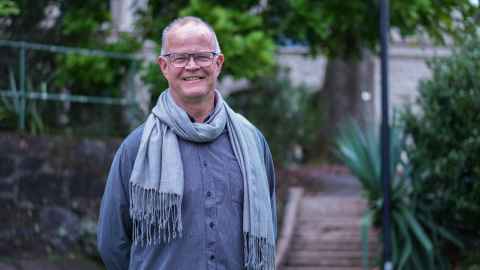Tackling our bad classroom behaviour problem
1 July 2024
Opinion: When it comes to dealing with the bad behaviour blighting our classrooms, building authentic relationships is key.

You don’t necessarily need to have spent time in a classroom recently to know that bad behaviour is an issue of increasing concern in our schools.
An OECD survey of teenagers from December 2023, for example, found they were more likely than others in the OECD to report problems. These included noise and disorder, distraction from phones and other digital devices, and students not listening to their teacher.
The report also showed that high levels of disruption were associated with lower scores in the Programme for International Student Assessment (PISA) maths test.
And, in March, media outlets reported on a recent Education Review Office (ERO) report into the critical levels of disruptive and even violent behaviour in New Zealand classrooms. When interviewed by Newshub, Ruth Shinoda, head of ERO’s Education Evaluation Centre, said classroom behaviour was a significant and persistent issue in New Zealand and, that over the past 20 years, our classroom behaviour has been among the worst in the OECD.
Half of all teachers surveyed thought that all types of disruptive behaviour had become worse in the past two years.
The significant global event of the past few years has, of course, been the Covid-19 pandemic, and the responses of different societies to keeping their populations safe. In New Zealand, the response included extensive lockdowns during which students engaged in remote emergency learning – if they engaged in any learning at all.
The effect of extended periods away from school has been to disconnect students from the complex social fabric of the classroom and allow them to indulge in lengthy periods of very self-focused activity. They may simply have fallen out of the habit of taking the needs of others into consideration in many aspects of their behaviour and thinking, judging by the 2022 school stand down rate, which was the highest in 20 years of record keeping.
There are simple strategies, however, to remedy this situation and get misbehaving students back in the fold.
While speaking to groups of teacher education students about managing classroom behaviour, I often remind them of how they used to behave for relief teachers at secondary school. These students would have been among the better behaved at their school but, even so, they recall their now-embarrassing acts of disobedience – giving the wrong name for example, to confuse the poor teacher put in charge of the class for an hour or a day.
Breaking usual classroom protocols and alleging that ‘our teacher lets us do it’ is another common ploy. In general, the overall standard of behaviour is lower when the usual classroom teacher is absent.
In the parlance of the sports field, the relief teacher is on a hiding to nothing. The students, without their usual teacher, expect something of a holiday; the usual rules of behaviour, constrained by a respectful relationship, don’t apply. There is a level of thrill in disobedience, when even otherwise well-behaved students feel anonymous and unrestrained, and things are almost certain to go awry, if only in minor ways.
If you personalise the request, you get a better result.
Which brings me to the all-important teacher-student relationship. In the case of the relief teacher, there is no prior relationship to draw on, and possibly no future one that sees any consequences for bad behaviour. Students feel safe in their anonymity.
So how should initial teacher education students on their practicum placements in schools begin to create a classroom climate in which students behave well?
Their first task is to learn students’ names. This creates an authentic, real-world relationship between the participants that makes it very hard for students to act up. As an example, asking your student ‘Mike’ to close the curtains or turn off the lights is almost certain to result in action, whereas asking ‘you in the back row’ to do the same is most likely to result in no activity at all. If you personalise the request, you get a better result.
I don’t suggest this strategy by itself as a panacea for all classroom issues, but it’s a practical place to start. In his 2009 research, US author and educator Jeffrey Cornelius White found that person-centred education had positive outcomes for students in terms of participation, satisfaction and motivation to learn.
In his 2012 book Visible Learning for Teachers, notable New Zealand educator John Hattie also points out the significant impact of positive teacher-student relationships on student outcomes. This places 12th highest on a list of 150 influences on achievement.
Then there is the work of Māori education experts Russell Bishop and Mere Berryman, which identified underlying teacher and school behaviours and attitudes that make a difference to Māori achievement and were brought together in their Effective Teaching Profile (2009). This work notes that ‘Relationships and interactions between teachers and students in the classroom are key to effective teaching of Māori students’.
Bishop and Berryman also point out that effective interactions rely on: caring for students and acknowledging their mana; having high expectations; managing the classroom to promote learning; using a range of dynamic, interactive teaching styles; and teachers and students reflecting together on student achievement to move forward collaboratively.
It’s been a long time since my teachers addressed the poor behaviour of my peers and myself with the dark sarcasm that Pink Floyd made famous in The Wall, but students in some of today’s classrooms would still recognise that cutting mode of address immediately.
Could we not agree instead on Bishop and Berryman’s findings as aspirations for managing New Zealand’s classrooms of the future – and start enacting them?
Dr Brian Marsh is a professional teaching fellow in the Faculty of Education and Social Work. In the course of the academic year, he lectures, oversees student placements (practicums) and observes students in schools.
This article first appeared in the July 2024 issue of UniNews.